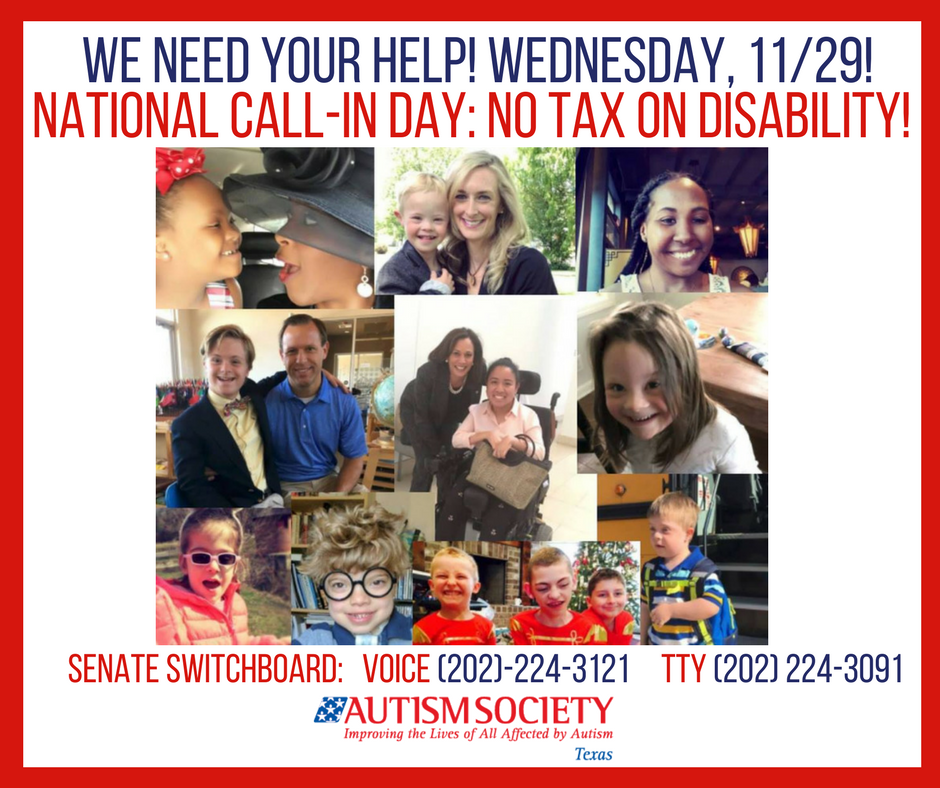Please join the Autism Society of America and advocates across the country on Wednesday, November 29th for National Call-In Day: No Tax on Disability!
 Photo images from Center for Public Representation.
Photo images from Center for Public Representation.
Call our Texas U.S. Senators today and urge them to please vote NO on the Tax Cuts and Jobs Act.
Background
On November 17, the House of Representatives passed its version of a tax bill. The Senate Budget Committee passed their version today. A final vote in the Senate is expected Thursday. Both bills are extremely harmful to people with disabilities. A conference committee may have to work out the differences between the bills, meaning that provisions in either bill could end up in a final tax bill. Both bills are harmful because they:
- Increase the deficit significantly to provide tax cuts that disproportionately benefit the wealthiest Americans and corporations.
- Lead to cuts to Medicaid, Medicare, Supplemental Security Income, and other critical programs for people with disabilities in order to reduce the deficits and debts incurred by tax cuts.
While the House tax bill does not directly cut Medicaid, the actions it takes will have the same or even worse effect on Medicaid and other services and supports for people with disabilities. The House bill that has many provisions that harm people with disabilities and their families by eliminating the following tax deductions and credits:
- Deduction for high medical expenses, which is critical to many people with disabilities and their families
- A $2,400 tax credit businesses can get when hiring someone with a disability
- A $5,000 tax credit for businesses that make their businesses accessible to people with disabilities (Architectural Barriers credit)
- Reduces incentive to contribute to non-profit agencies that often provide support for people with disabilities and their families (charitable giving)
The Senate bill is even worse. It includes a provision to repeal the individual mandate to obtain health insurance. The individual mandate is a central part of the Affordable Care Act (ACA) which greatly benefits people with disabilities by eliminating pre-existing condition exclusions, banning annual and lifetime limits, prohibiting discrimination based on health status, and much more. Repealing the individual mandate will:
- Result in almost 14 million people losing health care coverage (according to an analysis by the Congressional Budget Office (CBO)).
- Increase health insurance premiums for those purchasing coverage on the exchange by at least 10% for the unforeseeable future (also according CBO)·
- The CBO analysis also says the repeal of the individual mandate will save approximately $330 billion (because of the large number that will not be insured) over ten years. This money will be used to pay for a making the corporate tax cuts permanent and to cut to the tax rate for corporations and individuals on the upper income scale.
- According to the Tax Policy Center, the Senate plan shows that 87 million households earning less than $200,000 will get a tax increase under the plan
We have a VERY short timeline to stop this very harmful and unpopular legislation.
TAKE ACTION
- Contact your Senators NOW. We only have days to defeat this! Autism Society is co-sponsoring a national call in day on Wednesday, Nov. 29. Call your Senators. Use the Capitol Switchboard number202-224-3121 and ask for your Senators.
- Participate in a Tax Plan Protest Event.
WHAT TO SAY
- I am your constituent and a member of the Autism Society.
- Please vote NO on the Tax Cuts and Jobs Act.
- This tax bill will hurt people with disabilities and their families.
- Do not repeal the ACA individual mandate. This will further destabilize our health care system, raise premiums, and could lead to my family losing their health insurance.
- We cannot afford these tax cuts that disproportionately benefit the wealthiest Americans and large corporations.
- Tax reform should not be rushed. People should have time to understand the bill and how they will be affected.
- This bill will lead to fewer jobs for people with disabilities.
